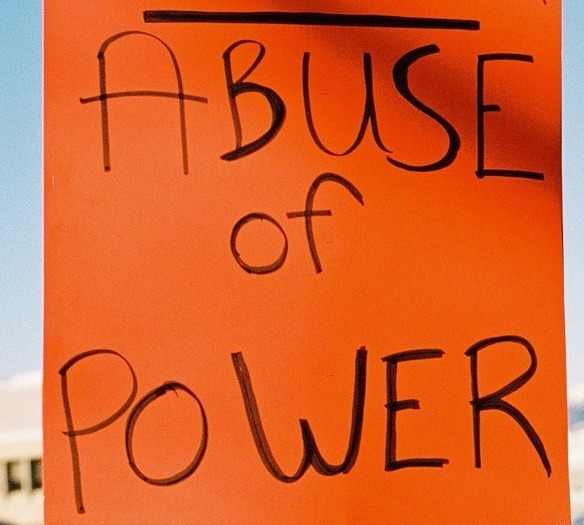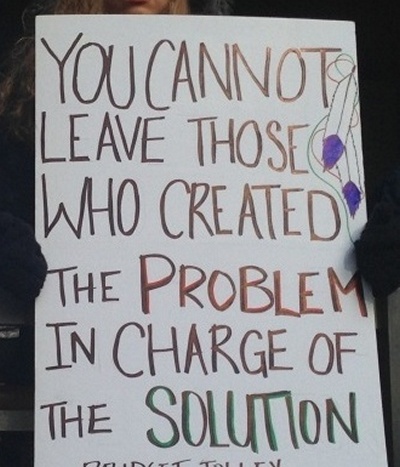|
April 16, 2021 - No. 29
Corruption and Hubris of the Privileged Elite
Dangers Posed by Seizure of
Government Decision-Making Power
by Private Interests
- Louis Lang -

• Revelations about Secret Negotiations to Import Radioactive Waste into Canada from Japan
• Revolving Door of Elite Officials Moving from Government to Private Sector and Back Again
• Unacceptable Conception of What Constitutes "Safe Storage" of Spent Nuclear Fuel
• The Need to Settle Scores with Abuse of Power and Privilege
Corruption and Hubris of the Privileged Elite
- Louis Lang -
This issue of Workers' Forum
addresses the dangers posed by waste material from nuclear reactors and
the control of decisions about its disposal by narrow private interests.
The seizure of governments by narrow private interests is a main
feature of the neo-liberal anti-social offensive. It is a matter of
profound
concern the working class must settle scores with. The articles in this
paper expose one of the several plans most recently revealed of how
narrow private interests have taken over governments to provide public
funds and entrust monopoly corporations with what they call, "the safe
storing of nuclear waste," in order to make enormous profits. As
the articles correctly point out, there is no such thing, because the
safe handling and storing of nuclear waste is a problem of science that
has yet to be sorted out.
The revelation by Radio-Canada that negotiations in this case are
going on in secret reveals the corruption inherent in what is touted as
the Canadian rules-based system and the need for the working people of
this country to put an end to it. The fact is that this continues the
practice of the Harper government which handed over the nuclear industry
and all the reactors in Canada to private interests. Not quite ten years
ago, Atomic Energy Canada (AECL), the Crown corporation which ran the
nuclear laboratories in Chalk River, Ontario, and owned and operated
several CANDU reactors in Canada, was broken up and sold to SNC-Lavalin.
The work of safely harnessing nuclear energy was
taken out of the hand of scientists and public authorities and made into
a for profit enterprise under the control of private interests. All
legal as far as passing laws goes.
One of the Harper government's last actions before losing the
election in 2015 was to create the Canadian National Energy Alliance
(CNEA) which is a government-owned but contractor-operated organization
(GOCO) which is one of the most lucrative pay-the-rich schemes
established under the guise of reducing the $7.9 billion nuclear waste
liability that was identified. The majority of the members of CNEA are
foreign corporations like Fluor and Jacobs, two Texas-based
multinationals involved in nuclear weapons production. The other main
member is SNC-Lavalin. The CNEA assumed control over all of Canada's
federal nuclear facilities and radioactive waste and the record shows
that since the establishment of this consortium the costs to the
Canadian government have almost quadrupled. According to AECL financial
reports, parliamentary appropriations rose from $327 million in 2015 to
$1.3 billion (approved) for the year ending March 31, 2021. AECL's
nuclear waste liabilities have not gone down, but appear to have
increased by about $200 million.
Without much public knowledge about the increased cost, let alone
discussion, the Trudeau government and AECL renewed the GOCO contract
with the CNEA early during the pandemic lockdown in the spring of 2020.
The CNEA is also behind the proposal for a disposal facility for nuclear
waste at the Canadian Nuclear Laboratory campus
at Chalk River. The proposal has been met with strong opposition from
First Nations, civil society groups, 140 Quebec municipalities, nuclear
waste experts and scientists and concerned citizens. Despite the broad
opposition the project continues and the consortium continues to receive
close to a billion dollars a year from public funds. To make
matters worse the consortium is bringing thousands of truck-loads of
radioactive waste to the Chalk River site from other federal facilities
in Manitoba, Ontario and Quebec.
The bottom line is that with the domination of the nuclear industry
by private interests not only has the necessary scientific research
under public control been sabotaged but tons of radioactive substances
that remain toxic to all life for hundreds of thousands of years are
being disposed of with no thought of the permanent damage to the
environment and the contamination of the Ottawa River, a source of
drinking water for Ottawa, Gatineau, Montreal and many other
communities.
The domination of the nuclear industry by private interests is
important to show the seriousness of the situation. This dangerous
course of action has been put in place over many years by different
governments and it will not stop there. The fact that the citizenry does
not control the decisions which set the direction of the economy and
that
narrow private interests have been politicized with the revolving door
between the cabinet, the privy council and private consultants and the
oligopolies poses a great danger for the people and the natural
environment. All major decisions in the economy and politics must be
in the hands of the people on the basis of a renewed democratic
political process which blocks the current ways used to deprive the
people of decision-making power.
Note
1. See TML Daily, January 24, 2014.

Radio-Canada has revealed that former Prime Minister Jean
Chrétien has been engaged in secret negotiations with officials
of Tokyo Electric Power Corporation (TEPCO) and others in powerful
positions in Japan to import their radioactive waste into Canada for
burial in Labrador. Chrétien was Liberal Party Prime Minister
from 1993 to
2003. He now works with the global law firm Dentons, which had a gross
income of just under $3 billion in 2019. Dentons is counsel for the
promoters of the secret project to import nuclear waste, who are
associated with a company called Terra Vault.
Radio-Canada obtained emails between Chrétien and Japanese
business people connected with the nuclear industry and mass media.
Chrétien, described in a Dentons' email as a "close adviser" of
current Prime Minister Justin Trudeau, was assisting to bring together
two members of the Japanese elite with Tim Frazier, former U.S.
government
nuclear adviser and principal investor in Terra Vault, and Montreal
business executive and investor Albert Barbusci, who is an advocate of
storing other countries' nuclear waste in Canada.[1]
 The
two Japanese are Takuya Hattori, the Senior Advisor of the Japan Atomic
Industrial Forum and former Vice President of TEPCO, and Hisafumi Koga,
the former President of Kyodo News Agency, the largest in Japan, who
now heads its public relations arm. A meeting of all involved was
organized for February 2020 to discuss in person
how to pursue the project but was postponed due to the pandemic. The
two Japanese are Takuya Hattori, the Senior Advisor of the Japan Atomic
Industrial Forum and former Vice President of TEPCO, and Hisafumi Koga,
the former President of Kyodo News Agency, the largest in Japan, who
now heads its public relations arm. A meeting of all involved was
organized for February 2020 to discuss in person
how to pursue the project but was postponed due to the pandemic.
Radio-Canada writes, "Months after Chrétien's letter to
the
Japanese PR executive, Hisafumi Koga's response in September 2019
illustrates the secretive nature of the discussions. 'As the
success of the project hinges on the cooperation of all stakeholders,
utmost care needs to be taken to keep the information from leaking,'
Hisafumi Koga
wrote, accepting Chrétien's invitation for a meeting in Canada. 'I
understand that I'm attending as a private person,' Koga said.
Takuya Hattori, who held senior positions at TEPCO, the company
involved in the Fukushima nuclear accident, was also to be part of the
trip, according to the emails."
Radio-Canada also obtained emails from the Montreal investor
Barbusci and associates in Dentons. It writes, "A June 2020 email from
Barbusci refers to a 'smooth transition' after former
Newfoundland and Labrador premier Dwight Ball's resignation, which took
effect in August. 'As you may already know, [Liberal Party]
Premier Ball has
announced that he will be stepping down and a new leader will be named
on August 3rd [2020]. That said, we plan to stay connected with Premier
Ball so the transition is expected to be smooth,' Barbusci wrote.
"Four years ago, Ball's chief of staff, Greg Mercer, was found to
have failed to report his previous lobbying activities on time. Some of
his lobbying involved the company at the heart of the group's nuclear
storage project, Terra Vault. Frazier, the former U.S. nuclear adviser
and another key player in the project, is one of Terra Vault's major
shareholders. He refused to speak with Radio-Canada. [...]
"[Former Premier] Ball also said Thursday, Chrétien mentioned the
idea of a DGR [deep geological repository] in Labrador to him."
"My response to him was swift to say, as the premier my government
is not interested in entering into any discussions with your clients on
this issue, reads Ball's statement. Barbusci said he wasn't aware of
the lobbying incident [with Ball's chief of staff, Greg Mercer] and
that it precedes his involvement in the DGR project. He also said the
location for the site wasn't yet decided."
"Trusted Adviser"
An email from a Dentons' lawyer named Terry Didus to all those
involved in the nuclear waste project extols Chrétien's
relations with the current Liberal Party federal government, calling
the former Prime Minister a "trusted adviser" to Prime Minister
Trudeau. After the Trudeau Liberals' 2019 re-election as a minority government, Didus
writes enthusiastically to the others, "Good news: Liberals back!" And
then later, "Better news: Jean [Chrétien] has now been
'appointed' by Justin Trudeau as his 'trusted adviser.' In essence,
Jean will be privy to all major policy decisions going forward."
In the Radio-Canada interview, Chrétien appeared frustrated
by the Didus email and denied the implication that he is a "trusted
adviser" and "lobbyist." He said, "I'm not his [Trudeau's] trusted
adviser [...] I don't want to be a lobbyist. I told you that."
In the same interview, Chrétien again defended the project to
store Japan's nuclear waste in Canada, saying we have "a responsibility
to store used nuclear material" and that he is "simply acting out his
duty as a lawyer and agreed to sign the 2019 letter when asked by
colleagues at his firm. We made money selling uranium so we should help
to solve the problem that the countries who bought our uranium are
facing with that."
Chrétien also presented nuclear power as green and an option
to combat climate change. Radio-Canada writes that Chrétien "believes
atomic energy is one of the solutions to combating climate change."
 All
of it reveals the stinking mess of entanglements between governments,
narrow private interests, the revolving door of those who are in
government who then, out of government, use their links to further
their own narrow private interests while serving the interests of the
oligopolies which control entire sectors of the world economy. It
confirms that the real conflicts of interest being hidden today are
those caused by the fact that what is called a democracy is comprised
of those in government who take decisions in secret to serve narrow
private interests and those who are mere subjects with no say over any
of the decisions which concern their lives. All
of it reveals the stinking mess of entanglements between governments,
narrow private interests, the revolving door of those who are in
government who then, out of government, use their links to further
their own narrow private interests while serving the interests of the
oligopolies which control entire sectors of the world economy. It
confirms that the real conflicts of interest being hidden today are
those caused by the fact that what is called a democracy is comprised
of those in government who take decisions in secret to serve narrow
private interests and those who are mere subjects with no say over any
of the decisions which concern their lives.
The aim of the economy to make maximum profit in the fastest time
blocks scientists and technicians from doing all-round work. Regarding
the nuclear industry, the oligarchs in control of the economy and
politics pour scientific efforts into producing nuclear power and bombs
while mostly ignoring the attendant issue of nuclear waste.
Scientists themselves have accused the oligarchy of doing little or
nothing to research and discover what to do with nuclear waste let
alone the issue of handling international affairs without violence.
Scientists and others say storing nuclear waste, no matter where, is
irresponsible and not a viable long-term solution. Radioactive waste
that cannot be
recycled to produce power is still extremely dangerous and harmful.
Exposure to a certain amount for even a short time can kill a human.
The secrecy of the nuclear waste project militates against the
modern need to inform the people of all issues and provide forms in
which mass discussion can occur and decisions reached where the people
have a say. A few powerful men or women having secret discussions and
taking decisions that affect the social and natural environment and
the very lives of the people and wildlife of Labrador are beyond the
pale. Who do they think they are would seem to be a pertinent question
but, more importantly, the need to stop these people and their secret
negotiations emerges as an urgent matter. No! to the transportation of
radioactive nuclear waste from Japan! No to its burial in
Labrador!
Note
1. Barbusci is the CEO of Sydney Harbour Investment Partners,
which "was formed specifically to assemble the business consortium
required to develop the deep-water Novaporte Mega-Terminal in Sydney,
Nova Scotia." He also established the Montreal-based advertising
agency Cadence Communications, founded in 1980.
"According to the [Nova Scotia] provincial registry
of lobbyists, Terra Vault shares a Montreal address with Sydney Harbour
Investment Partners, for which Chrétien was an international adviser.
In 2018, Nova Scotia RCMP investigated Chrétien for allegations of
illegally lobbying the province's then-premier Stephen McNeil about a
port proposal. The RCMP said they had found no wrongdoing." (Canadian Press, April 1, 2021)
That seems to be par for the course for RCMP investigations of wrong-doings by members of the elites.

 
The fact that former Prime Minister Jean Chrétien and others
move from serving in politics to serving private interests and back
again reveals that politics has degenerated to the point where rich
oligarchs control their enterprises, cartels and governments. They move
seamlessly back and forth taking decisions that affect the
people, economy and society. This exposes official politics and big
business as corrupt with their participants serving narrow private
interests in contempt of the people, economy, society and Mother Earth.
In an interview with Radio-Canada's Enquête,
Chrétien attempted to defend the project to bury nuclear waste
from foreign countries in Labrador. He said Canada as a "top seller of
uranium" has a responsibility to help clean up nuclear waste because it
makes money selling uranium used to produce nuclear energy and bombs.
The fact
that, for Chrétien and others of his ilk, dumping nuclear waste
in a hole in the ground is synonymous with "cleaning it up," shows
their arrogance and how self-serving and superfluous they are. Speaking
like that is no skin off their noses because presumably it is not their
families who will be living next to the dump sites.
According to Radio-Canada,
emails Chrétien drafted in 2019 and 2020 say: "We have some
responsibility, I believe, and if we can help, we should. Canada has
been the top supplier of nuclear fuel for many years, and I have always
thought that it is only proper that Canada should ultimately become the
steward and guarantor of the safe
storage of spent nuclear fuel after its first duty cycle. I will
arrange and participate in discussions in Canada, its provinces, and
potential partner countries to move the concept of a deep repository in
Northeastern Canada forward."
For its part, TEPCO is familiar with this method as it proposes to
simply dump into the Pacific Ocean contaminated water from its four
damaged nuclear reactors in Fukushima. In fact, the U.S. military
occupation forces privatized Japan's electricity sector in 1951
creating TEPCO along with eight other private enterprises in which U.S.
oligarchs could invest. TEPCO owns 11 nuclear reactors in Japan
including four reactors the tsunami destroyed in 2011 at its Fukushima
Daiichi facility. The company has not successfully decommissioned the
damaged reactors, which continue to emit radioactive contamination
blocking the return of 160,000 former residents and remediation of
the area. Emergency containment tanks holding contaminated water from
pipes to cool the reactors' cores are approaching their capacity. TEPCO
has applied for permission to release the toxic water into the Pacific
Ocean infuriating fishers and others concerned with such a practice.

The concept of "safe storage of spent nuclear fuel [in] a deep
repository" is refuted by many scientists and others. In response to
the news of the scheme to transport nuclear waste from Japan for
storage in Canada, Mycle Schneider, an international consultant on
nuclear energy based in Paris said, "I must say I was really stunned
that there is
a small group of very high-profile representatives that are coming
together to form this conspiracy."
Radio-Canada writes, "Schneider, whose expertise is sought after
around the world, said this type of project should be led by
governments, not industrialists. 'We are not talking about
building a garage somewhere. We're talking about a highly complex
project that no country in the world has so far successfully
implemented and, you know,
storing radioactive material.' Schneider also takes issue with the
group's explicit wishes to keep their plans covert, considering 'the dangers of the substances involved.'"
 Radio-Canada continues, "The practice is known as a 'deep geological
repository' or DGR. Canada's Nuclear Waste Management Organization has
for years tried to build a DGR to bury waste from Canadian nuclear
power plants, including in Ontario." Radio-Canada continues, "The practice is known as a 'deep geological
repository' or DGR. Canada's Nuclear Waste Management Organization has
for years tried to build a DGR to bury waste from Canadian nuclear
power plants, including in Ontario."
Mycle Schneider told Radio-Canada that the emails show this project
focuses on working with other nations to store their waste, starting
with Japan, something that has not been done before. "And there are
good reasons," Schneider said. "This is extremely radioactive material.
From a metre away, if spent fuel is not protected, it would deliver a
lethal dose to a human being within a minute."
The issue for many is that governments are not under their control.
DGRs, whether in Canada or elsewhere, forestall doing the necessary
research to find a safe method to handle, recycle or otherwise dispose
of nuclear waste. The oligarchs in control want the people to ignore the
issue and accept DGRs as the only possibility without discussion and
without scientific merit. Under neo-liberalism, the role of governments
is not to permit posing the question of the need to replace the system
which brings and keeps such governments in power.
Japan is located in the Pacific Ring of Fire, a region exposed to
volcanic eruptions, earthquakes and tsunamis. DGRs cannot even be
considered anywhere near the Ring of Fire, which begs the question why
the imperialists have built so many nuclear power plants throughout
Japan in the first place without considering what to do with the
nuclear waste and with little concern of the dangers involved for
nuclear plants from earthquakes and tsunamis. Of note is that the U.S.
has built six nuclear power plants in California above or near the San
Andreas Fault, which is a section of the Ring of Fire.

The activity of Jean Chrétien could be described as criminal
abuse of power and his position as a former Prime Minister. The problem
is not merely one of Chrétien's bad behaviour. The problem is
structural in that it derives from the imperialist system itself.
The private segmentation of the economy into competing parts and their
self-serving motive and control, and the forms that exist for taking
decisions both in the economy and politically are anachronistic. They
do not reflect the reality of the interrelated economy that demands
cooperation for mutual benefit. They do not reflect how people live,
produce and relate to one another in the twenty-first century. The aim
of the
economy and the forms of politics are not what they should be in modern
Canada where people must have the power to decide those matters that
affect their lives, society and nature in a manner that serves the
general interest.
The aim of the economy is private profit while everything about the
economy is public and social. The economy is public and social as it
affects not just those directly involved but entire populations, their
societies and the relations between humans and humans and humans and
nature. Major decisions cannot be based on narrow private
considerations. The technique required to produce and distribute social
product around the world is so complex and interrelated that every
decision as a matter of course must take the aim and who it serves into
consideration.
 The
decision-making process which serves the aim of squeezing maximum
private profit out of socialized conditions cannot continue. The
practice collides with the reality such as the production of nuclear
energy without considering and working through what to do with nuclear
waste and where to situate nuclear plants. The aim and forms of
control of the economy must be modernized so that all features of
production and distribution are taken into account based on what serves
the people, society and Mother Earth and affirm the right of the people
to set the direction of the economy themselves. The
decision-making process which serves the aim of squeezing maximum
private profit out of socialized conditions cannot continue. The
practice collides with the reality such as the production of nuclear
energy without considering and working through what to do with nuclear
waste and where to situate nuclear plants. The aim and forms of
control of the economy must be modernized so that all features of
production and distribution are taken into account based on what serves
the people, society and Mother Earth and affirm the right of the people
to set the direction of the economy themselves.
All major decisions in the economy and politics must be public and
social. These secret shenanigans of a former Prime Minister should be
considered criminal. Positions of influence based on private wealth and
privilege must be abolished. The actions as described in the emails and
comments of the people involved in this conspiracy to import
and bury radioactive waste reveal a ruling elite that are incapable of
even discerning right from wrong, autocracy from democracy, science
from self-serving obscurantism, and principles from opportunism. They
expose the liberal democratic institutions and thinking as in a state
of decay and corruption that must be swept away with the new.

(To access articles individually click on the black headline.)
PDF
PREVIOUS
ISSUES | HOME
Website: www.cpcml.ca
Email: office@cpcml.ca
|

